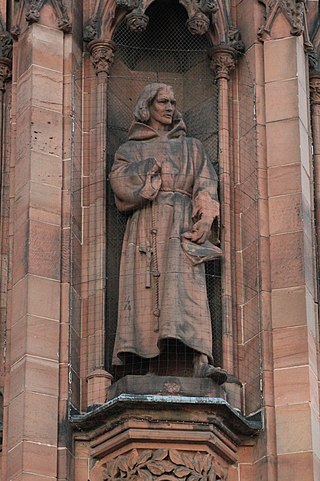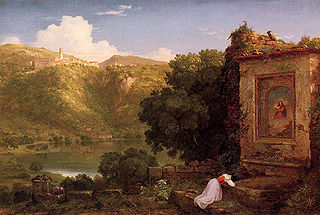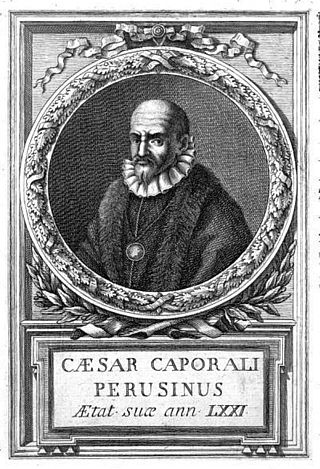
Quintus Horatius Flaccus, commonly known in the English-speaking world as Horace, was the leading Roman lyric poet during the time of Augustus. The rhetorician Quintilian regarded his Odes as just about the only Latin lyrics worth reading: "He can be lofty sometimes, yet he is also full of charm and grace, versatile in his figures, and felicitously daring in his choice of words."

Miguel de Cervantes Saavedra was an Early Modern Spanish writer widely regarded as the greatest writer in the Spanish language and one of the world's pre-eminent novelists. He is best known for his novel Don Quixote, a work often cited as both the first modern novel and "the first great novel of world literature". A 2002 poll of around 100 well-known authors voted it the "most meaningful book of all time", from among the "best and most central works in world literature".

Benjamin Jonson was an English playwright and poet. Jonson's artistry exerted a lasting influence upon English poetry and stage comedy. He popularised the comedy of humours; he is best known for the satirical plays Every Man in His Humour (1598), Volpone, or The Fox, The Alchemist (1610) and Bartholomew Fair (1614) and for his lyric and epigrammatic poetry. "He is generally regarded as the second most important English dramatist, after William Shakespeare, during the reign of James I."

The term Metaphysical poets was coined by the critic Samuel Johnson to describe a loose group of 17th-century English poets whose work was characterised by the inventive use of conceits, and by a greater emphasis on the spoken rather than lyrical quality of their verse. These poets were not formally affiliated and few were highly regarded until 20th century attention established their importance.

William Dunbar was a Scottish makar, or court poet, active in the late fifteenth and early sixteenth centuries. He was closely associated with the court of King James IV and produced a large body of work in Scots distinguished by its great variation in themes and literary styles. He was probably a native of East Lothian, as assumed from a satirical reference in The Flyting of Dumbar and Kennedie. His surname is also spelt Dumbar.
Mock-heroic, mock-epic or heroi-comic works are typically satires or parodies that mock common Classical stereotypes of heroes and heroic literature. Typically, mock-heroic works either put a fool in the role of the hero or exaggerate the heroic qualities to such a point that they become absurd.

John Marston was an English playwright, poet and satirist during the late Elizabethan and early Jacobean periods. His career as a writer lasted only a decade. His work is remembered for its energetic and often obscure style, its contributions to the development of a distinctively Jacobean style in poetry, and its idiosyncratic vocabulary.

Ancient Greek comedy was one of the final three principal dramatic forms in the theatre of classical Greece. Athenian comedy is conventionally divided into three periods: Old Comedy, Middle Comedy, and New Comedy. Old Comedy survives today largely in the form of the eleven surviving plays of Aristophanes; Middle Comedy is largely lost, i.e. preserved only in relatively short fragments by authors such as Athenaeus of Naucratis; and New Comedy is known primarily from the substantial papyrus fragments of Menander.
The Odes are a collection in four books of Latin lyric poems by Horace. The Horatian ode format and style has been emulated since by other poets. Books 1 to 3 were published in 23 BC. A fourth book, consisting of 15 poems, was published in 13 BC.
Crissa or Krissa or Crisa or Krisa (Κρῖσα) was a town in ancient Phocis. Crissa was regarded as one of the most ancient cities in Greece. It was situated inland a little southwest of Delphi, at the southern end of a projecting spur of Mount Parnassus. It is mentioned in the Catalogue of Ships in the Iliad as the "divine Crissa". According to the Homeric Hymn to Apollo, it was founded by a colony of Cretans, who were led to the spot by Apollo himself, and whom the god had chosen to be his priests in the sanctuary which he had intended to establish at Pytho. In this hymn, Crissa is described as situated under Parnassus, where no chariots rolled, and no trampling of horses was heard, a description suitable to the site of Crissa upon the rocks. In like manner, Nonnus, following the description of the ancient epic poets, speaks of Crissa as surrounded by rocks. Moreover, the statement of Pindar, that the road to Delphi from the Hippodrome on the coast led over the Crissaean hill, leaves no doubt of the true position of Crissa, since the road from the plain to Delphi must pass by the projecting spur of Parnassus on which the modern village of Chrisso stands. In the Homeric hymn to Apollo, Crissa appears as a powerful place, possessing as its territory the rich plain stretching down to the sea, and also the adjoining sanctuary of Pytho itself, which had not yet become a separate town. In fact, Crissa is in this hymn identified with Delphi. Even in Pindar, the name of Crissa is used as synonymous with Delphi, just as Pisa occurs in the poets as equivalent to Olympia. Metapontium in Magna Graecia is said to have been a colony of Crissa.
Antonio Abati was an Italian baroque poet. He was a member of several Italian literary academies, including the Umoristi, where he read his satire Ragguaglio di Parnaso, dedicated to the bad poets of the times. Between 1634 and 1638, Abati was in Viterbo, where he made the acquaintance of Salvator Rosa. Rosa was in large part inspired to become a satirist by his example. His satires were first published in Venice in 1651 and went through a number of editions.
Trajano Boccalini was an Italian satirist.

Il Penseroso is a poem by John Milton, first found in the 1645/1646 quarto of verses The Poems of Mr. John Milton, both English and Latin, published by Humphrey Moseley. It was presented as a companion piece to L'Allegro, a vision of poetic mirth. The speaker of this reflective ode dispels "vain deluding Joys" from his mind in a ten-line prelude, before invoking "divinest Melancholy" to inspire his future verses. The melancholic mood is idealised by the speaker as a means by which to "attain / To something like prophetic strain," and for the central action of Il Penseroso – which, like L'Allegro, proceeds in couplets of iambic tetrameter – the speaker speculates about the poetic inspiration that would transpire if the imagined goddess of Melancholy he invokes were his Muse. The highly digressive style Milton employs in L'Allegro and Il Penseroso dually precludes any summary of the poems' dramatic action as it renders them interpretively ambiguous to critics. However, it can surely be said that the vision of poetic inspiration offered by the speaker of Il Penseroso is an allegorical exploration of a contemplative paradigm of poetic genre.

Giambattista Marino was an Italian poet who was born in Naples. He is most famous for his epic L'Adone.
"The Inchcape Rock" is a ballad written by English poet Robert Southey. Published in 1802, it tells the story of a 14th-century attempt by the Abbot of Arbroath ("Aberbrothock") to install a warning bell on Inchcape, a notorious sandstone reef about 11 miles (18 km) off the east coast of Scotland. The poem tells how the bell was removed by a pirate, who subsequently perished on the reef while returning to Scotland in bad weather some time later.
Eaton Stannard Barrett was an Irish poet and author of political satires. He also wrote a comic novel: The Heroine, or: Adventures of a Fair Romance Reader (1813).

Ishar Singh ‘Ishar’ (1892–1966) was one of the most renowned Punjabi humorous poets of the 20th century.
The Academia Antártica was a society of writers, poets and intellectuals—mostly of the criollo caste—that assembled in Lima, Peru, in the 16th and 17th centuries. Their objective was to author a body of literature that matched or surpassed that of Europe's and would prove that literariness indeed thrived in Spain's remotest colonies. Members of this collective together published several anthologies of original writings and translations, the most famous of which are the Primera parte del Parnaso Antártico de obras amatorias and the Segunda parte del Parnaso Antártico de divinos poemas. These are dated 1608 and 1617, respectively.
William Woty (1731?–1791) was an English law clerk and hack writer, known for light verse.

Cesare Caporali was an Italian Renaissance poet.











